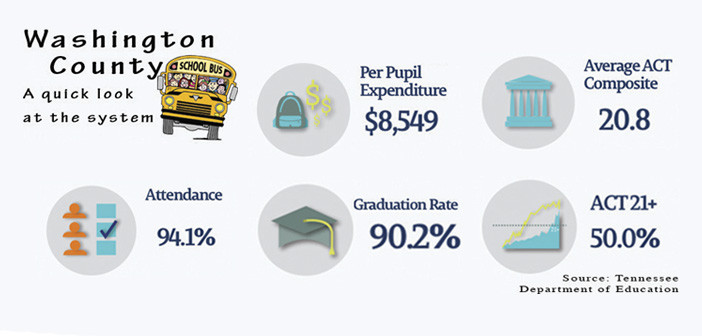By Collin Brooks
It’s a rare year when it comes to state report cards for the local school systems, but that didn’t mean that they didn’t learn anything from their results that were released by the Tennessee Department of Education.
One of the first things that stuck out to Washington County Director of Secondary Education Dr. Bill Flanary was the discrepancy in funding, with Washington County providing $8,549 per student. The state average is $9,499.
“We have been ranked at the bottom for so many years,” Flanary said. “It isn’t a new thing, just about every time a report comes out we see that.”
He said that in order for the system to just get to the local average, they would need close to $9 million worth of new funding.
One of the brightest spots for the county system was their average ACT score, which is a 20.8 — the state average is 19.9. The 2014-2015 report card had the system’s composite ACT score just below the state average at 19.7.
“One thing that really jumped out at me is our average ACT Composite is close to a 21,” Flanary said. “That ties us for first place among county school systems in Northeast Tennessee and we are pretty jazzed about that.”
A concerted effort by the system was made toward improving their ACT scores and while central office has tried to do a lot to help that effort, Flanary said that it was the faculty at the high schools that deserve more credit.
“Those faculties in those high schools are focusing on the ACT, because that is a test — a score — that can change a kid’s life,” Flanary said.
In hopes of raising the system’s scores, there are now special recognitions for high test scores. Anyone that scores a 30 or above has their photos hanging inside of the schools. There is also a plus-two and a plus-three club that recognizes increases in scores.
“They are really celebrating success on that test,” Flanary said.
With the increased scores also came an increase in the percentage of students that scored a 21 or higher on the test, qualifying them for the Tennessee’s HOPE Scholarship. A total of 308 students or 50 percent of the graduating class qualified and Flanary said that was the highest in northeast Tennessee county school systems.
Some of the challenges include the graduation rate, which sits at 90.2 percent — that includes University High’s 100 percent rate, Flanary added.
“We’ve got some work to do there,” Flanary said. “No good sized public school system can get a 100 percent, it just doesn’t happen. But I figure that our realistic ceiling is about 94 percent, so we have some work to do.”
The state average is just over 88 percent, but Flanary said that he will feel better when the system reaches 92 percent and that he plans on throwing a party when the system reaches 93 percent on their graduation rate. Some of the ways they try to address that, besides programs inside of the high schools are safety nets like their alternative schools’ Midway and Asbury. They also have an online virtual academy and credit recovery programs within the schools.
“We’ve got a safety net, I think one time I counted close to 40 pieces to our safety net, but some still slip through,” Flanary said. “I’ll say that no one does more than Washington County to make sure these kids get a regular diploma on time. We really work hard at it.”
Flanary also said that there is a big discrepancy, county-wide, between female and male achievement.
“I have seen the female graduation rate as much as 10 percent higher than the males,” Flanary said. “We see ACT scores higher in girls, than boys. And the attendance number is far better with girls.”
Flanary said that some of that is related to a drop off in reading by males once they reach the age of 10-11.
“We’ve got to think that it’s because at about the age of 10-11, these little boys just stop reading, they just don’t like to read,” Flanary said.
Flanary said that the librarians at the schools continue to search high and low for books that peak the interest of county boys.




